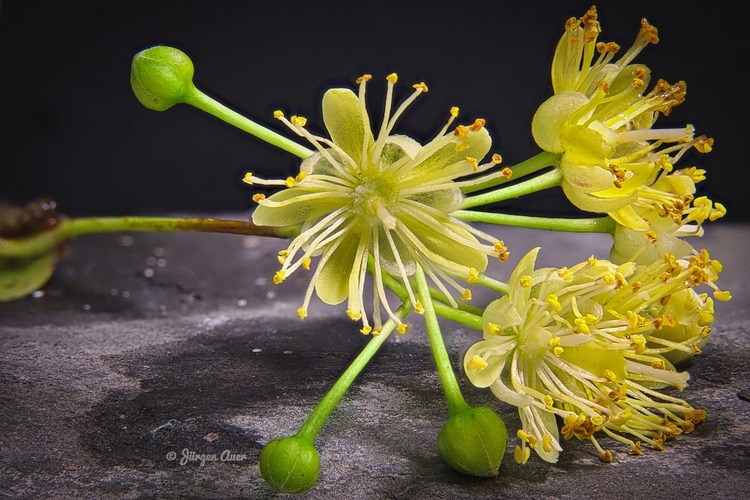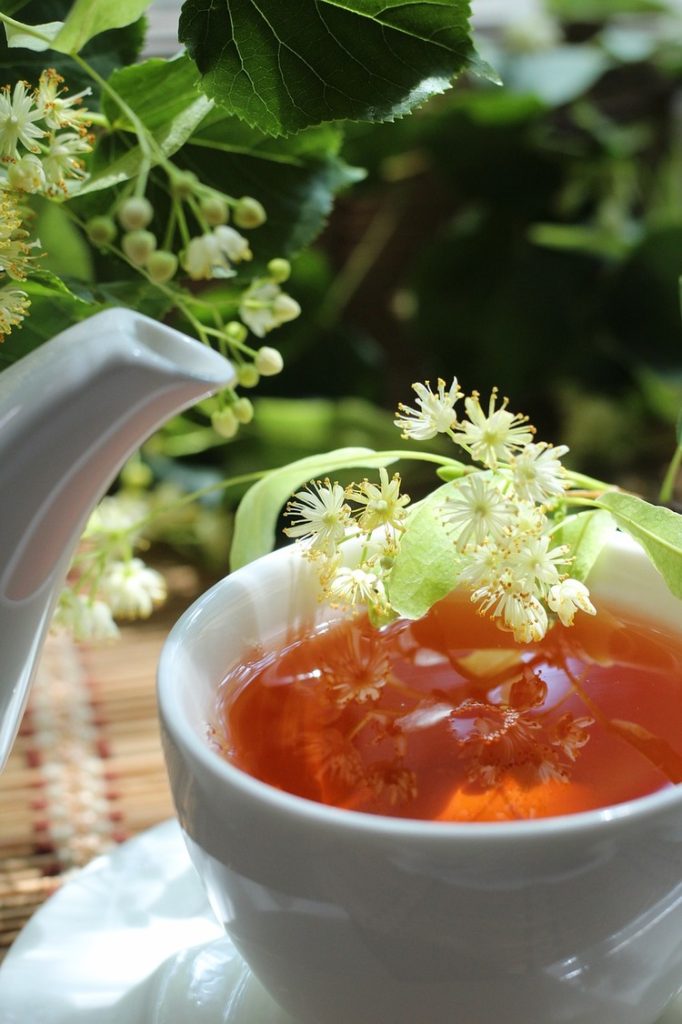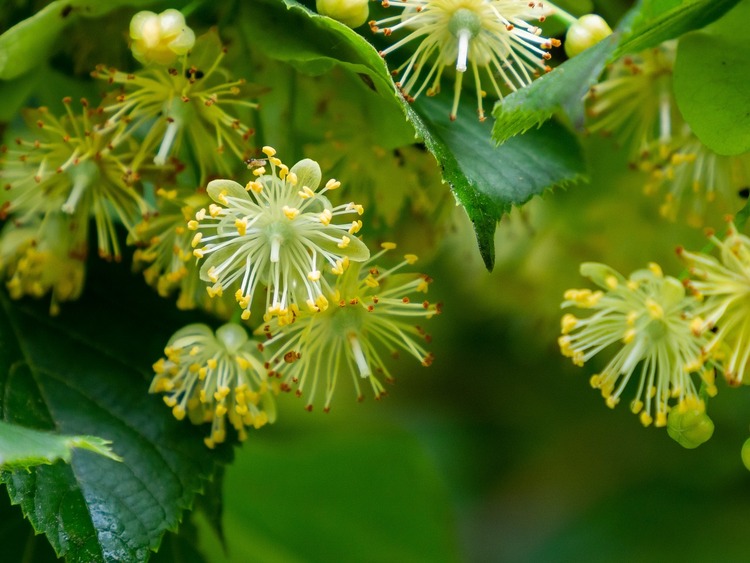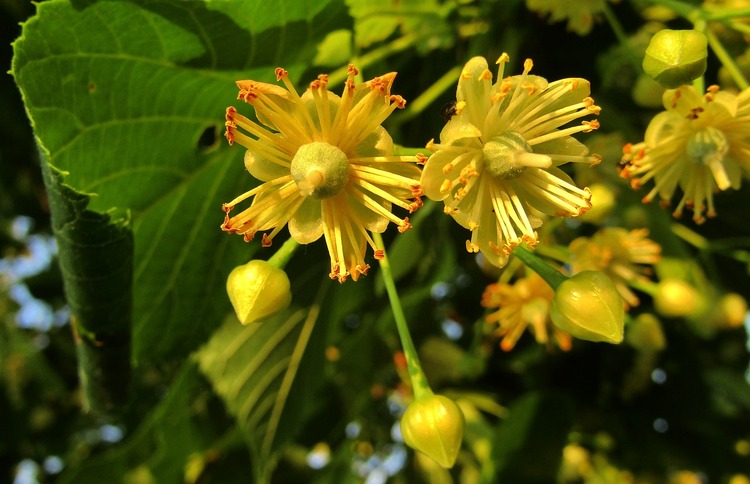Lime flower tea, popularly known as linden flower tea, is a delightful beverage leading the pack of herbal teas. With its delicate flavor, enticing aroma, and essential nutrients, this tea is more than just an ordinary drink. Derived from the flowers of the lime tree (Tilia genus), this refreshing concoction holds numerous health benefits that your body will thank you for.
As you sip on this delightful tea, it’s interesting to know that it has been extracted from the linden tree, a plant native to North America and Europe.
Please keep reading to learn more about this light, enjoyable tea with its multiple health benefits.
Please note: This article contains affiliate links, meaning I may earn a commission if you make a purchase by clicking a link. Of course, this comes at no extra cost to you and helps me keep offering readers solid information.

History and Origin
In the Middle Ages, lime flower tea, known as linden flower tea, became popular throughout Europe. You connect with centuries of history and tradition as you sip on this fragrant beverage. Due to their natural healing properties, monks and herbalists used the linden tree’s flowers, leaves, and wood for medicinal purposes.
At the time, people believed that the lime tree held magical powers. The tree was often planted near churches and village squares to represent love and protection. Gradually, this tradition created many lime trees across Europe, providing abundant lime flowers, perfect for brewing into teas.
In Europe’s folk medicine, lime flower tea was vital in promoting relaxation and calming nerves. It was often recommended as a remedy for insomnia, anxiety, and colds. The linden flowers also alleviated digestive issues, headaches, and muscle pains.
Different Varieties and Their Traditional Uses
There are several linden tree varieties, each offering a slightly different flower flavor and aroma. In this section, you’ll get to know a few different types and their uses.
Tilia cordata, or Small-leaved lime, is one of the most popular varieties for brewing lime flower tea. The blossoms are delicate, with a light floral taste that will make you feel relaxed and calm. Traditionally, this variety is used to ease digestion, reduce stress, and promote restful sleep.
Tilia platyphyllos or Large-leaved lime, is another popular choice for tea preparation. Its blossoms have a bolder flavor and stronger aroma, providing a slightly different sensory experience. Thanks to its soothing properties on the throat and lungs, it has been used for generations as a natural remedy for treating colds, coughs, and respiratory issues.
Tilia tomentosa, or Silver Lime, is a lesser-known variety but still offers a tantalizing brew. The tea made from this variety has a unique flavor profile, blending sweet and minty notes. Silver Lime has traditionally been used in Eastern Europe to treat tension and nervousness, calming the mind and body.
When selecting your lime flower tea, it’s essential to consider your personal preferences and the desired benefits.
Ingredients and Recipe
To make a cup of lime flower tea, you will need the following ingredients:
- 2 teaspoons of dried lime flowers
- 1 cup of freshly boiled water
- Optional: sweetener of your choice (like honey or sugar)
Now, let’s start preparing your tea:
- Place the 2 teaspoons of dried lime flowers in a tea infuser or a filter bag.
- Pour the boiling water (around 208°F/98°C) over the lime flowers to extract all their flavors.
- Steep the tea blend for about 5 minutes. Remember to watch the timing, as overstepping may result in a bitter taste.
- After steeping, remove the infuser or filter bag containing the lime flowers.
- Your hot tea is now ready to enjoy! If you like your tea a little sweeter, add your preferred sweetener to taste.

Lime Flower Tea Blends
Lime flowers have a mild, sweet, and slightly citrusy flavor, making them a versatile ingredient for herbal tea blends. Here are some herbal teas that pair well with lime flowers:
Chamomile: Combining lime flowers with chamomile creates a soothing blend with floral and honey-like notes. This blend is excellent for relaxation and as a bedtime tea.
Lemon Balm: Lime flowers and lemon balm complement each other beautifully, offering a citrusy and refreshing infusion. It’s an excellent choice for a zesty, aromatic tea.
Peppermint: Blending lime flowers with peppermint provides a refreshing and invigorating herbal tea. The cool, minty peppermint notes pair well with the lime flowers’ gentle sweetness.
Lavender: Lime flowers and lavender create a fragrant and calming blend with floral and herbal undertones. This combination is exceptionally relaxing and aromatic.
Hibiscus: Mixing lime flowers with hibiscus results in a visually appealing tea with a sweet and tart flavor profile. It’s a great choice for a refreshing, iced herbal tea.
Rose Hips: Lime flowers and rose hips create a fruity and floral combination. This blend is rich in vitamin C and has a well-balanced, slightly sweet flavor.
Ginger: Lime flowers and ginger make a warming and spicy infusion. The earthy, spicy notes of ginger complement the sweetness of lime flowers, making it an excellent choice for cold weather.
Lemongrass: Combining lime flowers with lemongrass produces a citrusy, zesty, and slightly earthy blend. It’s a refreshing option, especially when served iced.
Elderflower: Blending lime flowers with elderflower creates a sweet, slightly fruity tea. This combination has a delicate and pleasant flavor.
Spearmint: Lime flowers and spearmint provide a minty and slightly citrusy tea with a cooling effect. It’s a refreshing choice for a midday pick-me-up.
When blending herbal teas, you can experiment with different ratios to find the flavor balance that suits your preferences.
Linden Flower Tea Health Benefits
Relief from Stress and Anxiety
Lime Flower Tea is known for its calming effects. A cup of this herbal tea may help soothe your mind when you’re feeling stressed or anxious. Its natural soothing properties can provide relaxation and alleviate nervousness, making it an excellent choice for enhancing overall well-being.
Digestive Health
Lime Flower Tea’s potential benefits extend to your digestive tract as well. Its gentle properties can help ease gastrointestinal discomfort and support digestive health, relieving those who experience stomach issues. So, try sipping on some Lime Flower Tea next time your stomach feels uneasy.
Sleep and Relaxation
This tea could be a natural solution if you’re struggling with sleep problems like insomnia. Its sedative effects can promote relaxation, helping you unwind before bedtime. A warm cup of this herbal tea may provide a peaceful and restful night’s sleep.
Heart Health
Drinking lime flower tea can also positively impact your heart health. Its vasodilator properties can help reduce blood pressure, preventing heart diseases like arteriosclerosis and atherosclerosis.
Respiratory Benefits
This tea is an excellent option for those with colds, flu, or coughs. It has expectorant properties, helping to clear congestion in the respiratory tract and soothe sore throats. Savoring a cup of this tea may relieve coughing and other respiratory discomforts.
Anti-Inflammatory Effects
Inflammation can cause pain and discomfort, and lime flower tea may be an excellent natural remedy. This tea’s anti-inflammatory effects can relieve inflammation-driven pain, making it a beneficial option for those seeking a gentle yet effective solution.
Immune System Support
Lastly, this tea can assist in supporting your immune system. The tea is known to have various properties known to boost overall health, potentially helping defend your body against illnesses.

Active Compounds and Nutrients
Lime flower tea has various active compounds and nutrients. These compounds make the tea a powerful natural remedy with numerous health advantages.
For example, the tea contains the following:
- Flavonoids (including kaempferol and quercetin): These fantastic plant-based chemicals are known for their strong antioxidant properties.
- Tannins: They may contribute to the tea’s calming effect on your stomach and digestive system.
- Eugenol: A powerful volatile oil that offers both analgesic and anesthetic effects.
- Saponins: These are known for their immune-boosting benefits.
- Amino acids: These support various bodily functions.
- Phytonutrients: These are plant compounds that have numerous health benefits. These phytonutrients work harmoniously with your body, helping you feel the best version of yourself.
Potential Side Effects
While lime flower tea is generally considered safe for consumption, you should be aware of a few potential side effects. In rare cases, some people might experience an allergic reaction to the tea. If you notice itching, swelling, or difficulty breathing after drinking it, please discontinue use and consult your healthcare provider.
Moreover, drinking this tea during pregnancy and breastfeeding is not well-studied. It’s always important to consult your healthcare provider before introducing new herbal remedies during these crucial periods.
Additionally, you should consult your doctor before consuming this tea if you take medications. Some tea components may interact with certain medications, potentially causing unwanted side effects.
In some cases, overconsumption of lime flower tea may lead to gastrointestinal discomfort. To avoid such discomfort, following the suggested serving size and not consuming excessive amounts of the tea is recommended.
Buying Recommendations
If you are looking to buy these blossoms for tea online, please take into consideration the following products:
Organic Linden Blossoms – Lime Flower Herbal Tea

Organic Linden Herbal Tea – Caffeine Free Loose Leaf Flower Tisane

Wild Crafted Linden, Dried Flower and Leaf

Frequently Asked Questions
How to prepare lime blossom tea?
To prepare lime flower tea, start by boiling water in a kettle. Once it reaches a rolling boil, pour the hot water over 1 to 2 teaspoons of dried lime flowers in a teacup. Cover the cup and let it steep for 10 to 15 minutes. After the steeping time, strain your tea to remove the lime flowers and enjoy your soothing cup of lime flower tea.
What are the benefits of lime flower tea?
This tea comes with various benefits for your health. It is known for its calming properties and can help reduce anxiety and stress. Additionally, it can promote better sleep due to its mild sedative effects. Lime flower tea is also beneficial for alleviating cold and flu symptoms thanks to its anti-inflammatory and expectorant properties. It may also support heart health by improving circulation and lowering blood pressure.
Does lime flower tea have any side effects?
Lime flower tea is generally considered safe for most people. However, some individuals may experience an allergic reaction. If pregnant or breastfeeding, consult your healthcare practitioner before consuming this tea. Also, if you are taking any medications, especially those that interact with sedatives, it’s a good idea to discuss with your doctor before adding lime flower tea to your routine.
What does lime flower tea taste like?
Lime flower tea has a mild, sweet, and slightly floral taste. It is often likened to a subtle honey flavor, which makes it an enjoyable and soothing beverage.
Where can I buy lime flower tea bags?
You can find lime flower tea bags at specialty tea shops, health food stores, and online retailers. When purchasing, check the label for its ingredients and opt for one that is organic or free of artificial additives and flavors.
Can I mix lime flower tea with other flavors?
Yes, you can mix lime flower tea with other flavors to create a unique and delightful blend. Some popular choices include adding herbs like chamomile, lavender, or mint or experimenting with fruit flavors like lemon, berries, or apple. Feel free to get creative and find a combination that suits your taste preferences.

Have you tried this tea?
More About Flower Teas
What Does Jasmine Tea Taste Like?
What Does Hibiscus Tea Taste Like?
What Does Rose Tea Taste Like?